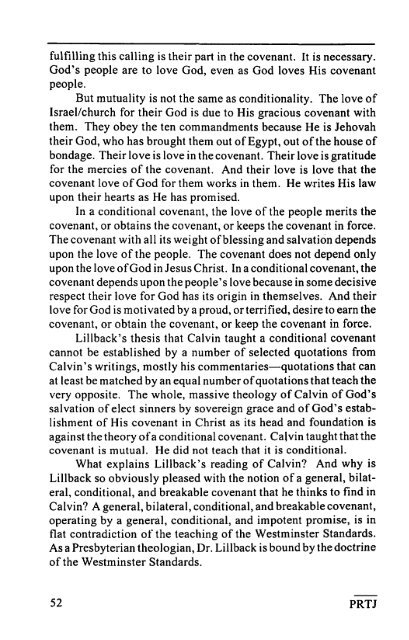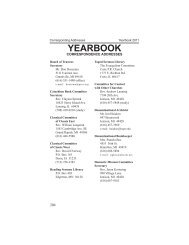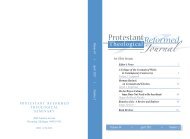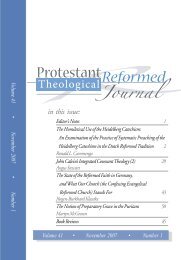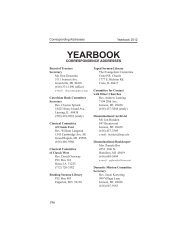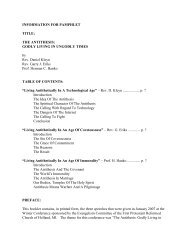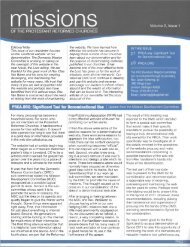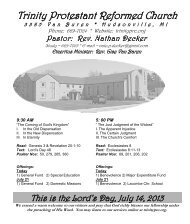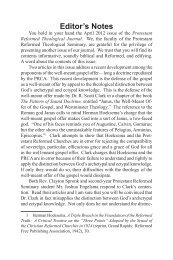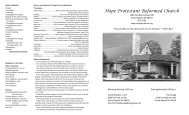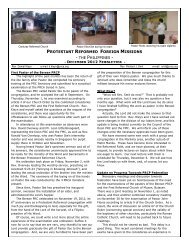Review ArticleA few pages later, Lillback analyzes Calv<strong>in</strong>'s doctr<strong>in</strong>e ofthecovenant as teach<strong>in</strong>g that "an <strong>in</strong>dissoluble bond exists betweenChrist and the elect" (p. 180).In the chapter, "Covenant, Predest<strong>in</strong>ation, and Hypocrisy <strong>in</strong>Calv<strong>in</strong>'8Theology," Lillback makes an extraord<strong>in</strong>arily significantquotation from Calv<strong>in</strong>'s commentary on Jeremiah 22:29, 30: "Weare taught that God is ever so consistent with himself, that hiscovenant, which he has made with Christ and with all his members,neverfails" (p. 213). The quotation shows that Calv<strong>in</strong> held that thecovenant is made with Christ as the head of the covenant and,therefore, with "his members," that is, the elect; that the covenant"never fails," that is, cannot be broken, <strong>in</strong> the sense ofnullified, bythose with whom it is made; and that this firm and last<strong>in</strong>g characterofthe covenant is due to God's be<strong>in</strong>g '~consistent with himself,"that is, His be<strong>in</strong>g the faithful, unchangeable God.Lillback himselfis forced to acknowledge that Calv<strong>in</strong> taughtan unconditional, unbreakable covenant "from God's vantagepo<strong>in</strong>t": "The covenant from God's vantage po<strong>in</strong>t is absolutelyunconditional. God's absolute goodness means that He cannotdeny His promises to His people:' "Yet, <strong>in</strong> another sense:'Lillback quickly adds, ~~that is from man's vantage po<strong>in</strong>t, thecovenant is conditional" (p. 169).When, a few pages later, Lillback comes to summarizeCalv<strong>in</strong>'s doctr<strong>in</strong>e ofthe covenant, he describes it, exclusively, asa "bilateral, mutual. conditional, and breakable covenant" (p.175). Man's '~vantagepo<strong>in</strong>t" has evidently won out. There is noteven a word about "God's vantage po<strong>in</strong>t." This is not surpris<strong>in</strong>g.When theologians play with the contradiction, "God saves men,but men also save themselves." the false gospel of man's sav<strong>in</strong>ghimself always drives out the gospel ofsalvation by grace alone.Contribut<strong>in</strong>g to Lillback's analysis of Calv<strong>in</strong>'s doctr<strong>in</strong>e ofthe covenant is Lillback's confusion of "mutual" with "conditional."Because Calv<strong>in</strong> taught that the covenant is "mutual,"Lillback concludes that for Calv<strong>in</strong> the covenant is conditional.When Calv<strong>in</strong> taught that the covenant is mutual, he meant that thecovenant makes demands upon God's covenant people. In thecovenant, they are called to love, fear, serve, and obey God. TheirNovember, 2001 51
fulfill<strong>in</strong>g this call<strong>in</strong>g is their part <strong>in</strong> the covenant. It is necessary.God's people are to love God, even as God loves His covenantpeople.But mutuality is not the same as conditionality. The love ofIsrael/church for their God is due to His gracious covenant withthem. They obey the ten commandments because He is Jehovahtheir God, who has brought them out ofEgypt, out ofthe house ofbondage. Their love is love <strong>in</strong> the covenant. Their love is gratitudefor the mercies of the covenant. And their love is love that thecovenant love ofGod for them works <strong>in</strong> them. He w·rites His lawupon their hearts as He has promised.In a conditional covenant, the love of the people merits thecovenant, or obta<strong>in</strong>s the covenant, or keeps the covenant <strong>in</strong> force.The covenant with all its weight ofbless<strong>in</strong>g and salvation dependsupon the love of the people. The covenant does not depend onlyupon the love ofGod <strong>in</strong> Jesus Christ. In a conditional covenant, thecovenant depends upon the people's love because <strong>in</strong> some decisiverespect their love for God has its orig<strong>in</strong> <strong>in</strong> themselves. And theirlove for God is motivated by a proud, orterrified, desire to earn thecovenant, or obta<strong>in</strong> the covenant, or keep the covenant <strong>in</strong> force.Lillback's thesis that Calv<strong>in</strong> taught a conditional covenantcannot be established by a number of selected quotations fromCalv<strong>in</strong>'s writ<strong>in</strong>gs, mostly his commentaries-quotations that canat least be matched by an equal number ofquotations that teach thevery opposite. The whole, massive theology of Calv<strong>in</strong> of God'ssalvation ofelect s<strong>in</strong>ners by sovereign grace and ofGod's establishmentof His covenant <strong>in</strong> Christ as its head and foundation isaga<strong>in</strong>st the theory ofa conditional covenant. Calv<strong>in</strong> taught that thecovenant is mutual. He did not teach that it is conditional.What expla<strong>in</strong>s Lillback's read<strong>in</strong>g of Calv<strong>in</strong>? And why isLillback so obviously pleased with the notion ofa general, bilateral,conditional, and breakable covenant that he th<strong>in</strong>ks to f<strong>in</strong>d <strong>in</strong>Calv<strong>in</strong>? A general, bilateral, conditional, and breakable covenant,operat<strong>in</strong>g by a general, conditional, and impotent promise, is <strong>in</strong>flat contradiction of the teach<strong>in</strong>g of the Westm<strong>in</strong>ster Standards.As a Presbyterian theologian, Dr. Lillback is bound by the doctr<strong>in</strong>eofthe Westm<strong>in</strong>ster Standards.52 PRTJ
- Page 1 and 2: ProtestantReformedTheologicalJourna
- Page 3 and 4: EDITOR'S NOTESProf. Russell J. Dyks
- Page 5 and 6: For there are many, even l unruly,
- Page 7 and 8: happen to hold unwittingly to some
- Page 9 and 10: tion oftheir false teachings. II Pe
- Page 11 and 12: est, they are very weak, at worst,
- Page 13 and 14: truth~' (see I Tim. 4: 1 - 4). Ever
- Page 15 and 16: Thomas Bradwardine:Forgotten Mediev
- Page 17 and 18: ated grace and uncreated grace. Unc
- Page 19 and 20: Bradwardine faces the question ofth
- Page 21 and 22: the age, namely, that having set fo
- Page 23 and 24: did not identify Thomas Bradwardine
- Page 25 and 26: The first is that Bradwardine was a
- Page 27 and 28: to Bradwardine as oneof"two pre-emi
- Page 29 and 30: Gospels, Acts, and Revelation. Sir
- Page 31 and 32: power of the papacy in Bradwardine'
- Page 33 and 34: The Serious Callof the Gospel -Is t
- Page 35 and 36: elieve th~s proclamation with uprig
- Page 37 and 38: to bring good news with their "fig
- Page 39 and 40: nation, we read of Melchisedek, the
- Page 41 and 42: official activity ofa monarch's her
- Page 43 and 44: 8): "Calling is ofthose elect and r
- Page 45 and 46: ut all his posterity unable to obey
- Page 47 and 48: alone, and He saves whom He will. E
- Page 49 and 50: have moved away from the notion oft
- Page 51: every member ofthe visible, institu
- Page 55 and 56: contingent. Further, Calvin did not
- Page 57 and 58: ofacceptance in terms of merit, ins
- Page 59 and 60: covenant ofgrace and works, or it i
- Page 61 and 62: Spiritual, Suffers Them to DefileTh
- Page 63 and 64: the gospel is preached" (p. 212).In
- Page 65 and 66: "They do not hold that JesusChrist
- Page 67 and 68: II Corinthians 3:6 that "the letter
- Page 69 and 70: is to oppose and to repulsethat sec
- Page 71 and 72: Rightly Divided: Readings inBiblica
- Page 73 and 74: is necessary speaks volumesabout th
- Page 75 and 76: Guilt, Grace and Gratitude,Lectures
- Page 77 and 78: 76ted under the new? If it wererigh
- Page 79 and 80: er to keep himself holy; forthe Sab
- Page 81 and 82: there is room for both positionsin
- Page 83 and 84: Dr. Gannett's eschatologyalso effec
- Page 85 and 86: that, but man has a corrupt nature(
- Page 87 and 88: the love of God is "universal"(p. 5
- Page 89 and 90: ever, throughout the book thereis n


